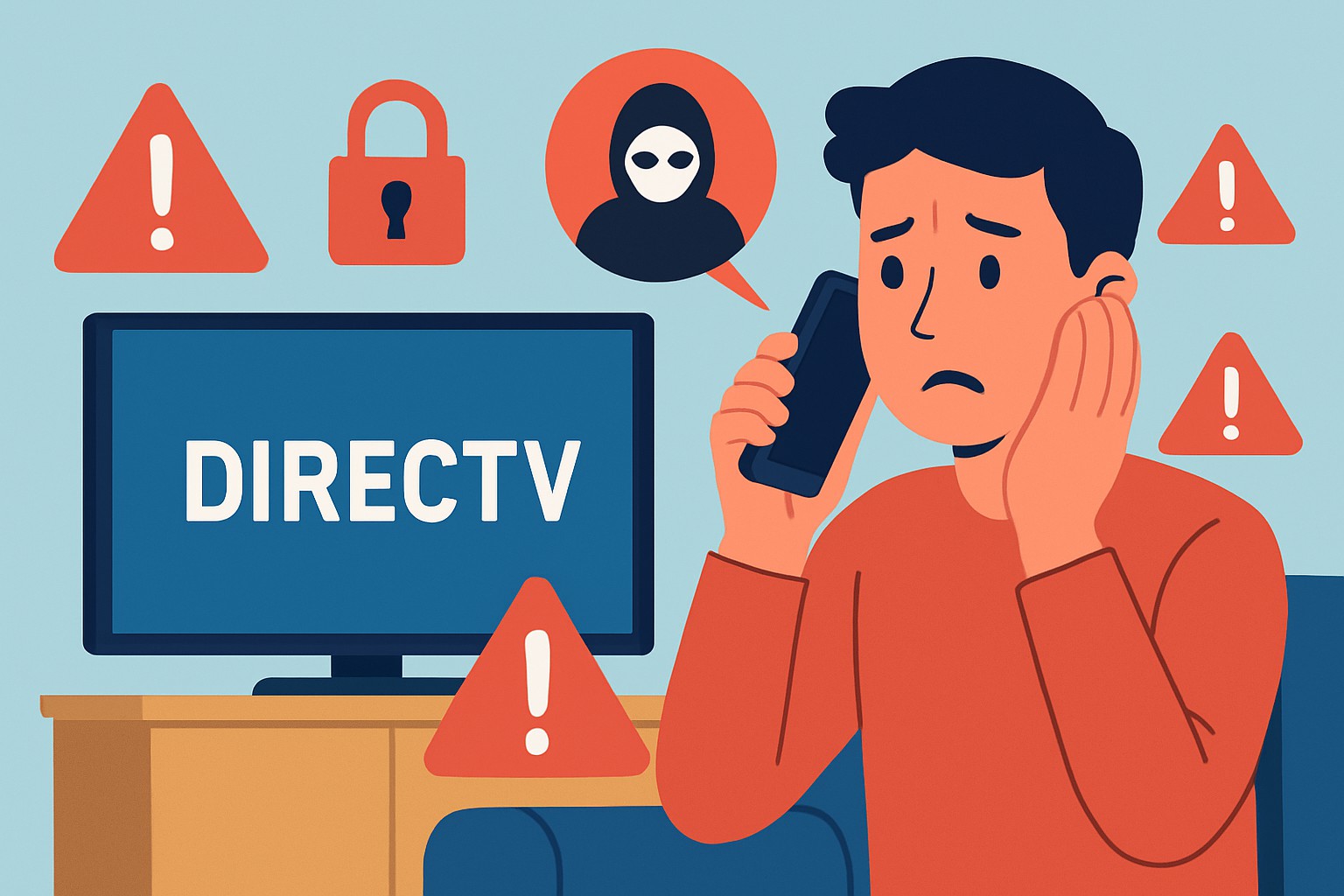Direct TV Scam Warning Signs Every Customer Should Know

Direct TV scams have been creeping up lately, tripping up thousands of unsuspecting customers every year. These crafty fraudsters love to play the part of Direct TV reps, coaxing people into handing over sensitive information or coughing up payments that should not be happening.
This article offers a clear and down-to-earth look at common Direct TV scams by peeling back the curtain on how scammers operate and the psychological tricks they often pull. It lays out straightforward practical steps you can take to spot these scams from a mile away and guard yourself effectively—whether it’s catching the usual red flags, verifying if a contact is legitimate, or knowing what to do if you find yourself in the scammer’s crosshairs.
What’s Usually Cooking in a DirecTV Scam?
A Direct TV scam usually appears when shady characters pretend to be from the Direct TV company. Their goal is to sneak away with your money or personal info like your Social Security number or bank details. They may also try to access your Direct TV account without you knowing. These scams often show up as fake calls, emails or messages that seem legit at first glance but are really clever tricks designed to steal your trust.
How Do Direct TV Scams Usually Work Their Magic?
Scammers tend to stick to a pretty predictable playbook to win your trust and nudge you into handing over sensitive info or cold, hard cash. They often pop up out of the blue, pretending to be someone you know and trust so well it’s almost scary. Then come the urgent threats or those too-good-to-be-true promises designed to crank up the pressure.
Scammers usually kick things off by reaching out via phone calls, emails or texts using fake numbers or addresses that look like they’re from Direct TV—tricky little impersonators.
They play the part of a Direct TV rep pretty well and drop familiar account details or recent service hiccups to build fake trust.
Then comes the ask for your sensitive info—think Social Security number, credit card details or login credentials—the stuff you’d never want to share.
They crank up the pressure by creating a sense of urgency. They tell you to pay immediately or risk losing service or facing legal troubles—don’t fall for the panic play.
They try to snag your money through oddball methods like wire transfers, gift cards or prepaid debit cards or worse, they swipe your identity to pull off more scams.
Typical Warning Signs That You Might Be Falling for a Direct TV Scam
Recognizing the usual red flags in scam calls or messages can really save you from a world of trouble. Keep an eye out for classic high-pressure tactics, fishy contact details or requests to pay in unusual ways.
- Getting an unexpected call or message from someone claiming to be Direct TV, especially when you weren’t expecting to hear from them.
- Feeling pressure to pay right on the spot or being threatened with service shutoff out of the blue without any heads-up.
- Being nudged to spill sensitive info like your passwords or Social Security number.
- Coming across language that’s downright scary or pushy and designed to make you panic.
- Noticing caller IDs or email addresses that don’t line up with official Direct TV contacts, sometimes with silly errors that stand out.
- Spotting clumsy grammar or weird spelling mistakes which usually scream scam.
- Being told to pay through strange ways like gift cards or wire transfers, always a sign to hit the brakes.
How to Tell if a Direct TV Contact Is the Real Deal
Someone suddenly reaches out claiming to be from Direct TV it’s a smart move to double-check their identity before handing over any personal info or cash. I have found that sticking to official channels and secure methods is the best way to dodge scams.
If you get a suspicious call or message, it’s usually best to politely brush it off and avoid sharing details.
Always track down Direct TV’s official customer service number or website on your own instead of taking the caller’s word.
When you want to check for alerts or messages, log into your official Direct TV account through their authorized site rather than relying on surprise communications.
Never share personal or payment info in response to unexpected calls, emails or texts—scammers love to bait their hooks that way.
If something smells fishy in a call or message, report it to Direct TV’s fraud department so they can investigate and help keep others from falling into the same trap.
Steps to Take If You Suspect You Might Be Dealing with a Scam
If you suspect you’ve been caught up in a Direct TV scam or inadvertently handed over personal details, acting quickly can help keep the fallout to a minimum. It’s key to lock down your accounts, notify Direct TV and the appropriate authorities, and stay vigilant over your financial activity.
- Change your Direct TV and any related account passwords right away to shut the door on any unwelcome visitors.
- Reach out to Direct TV customer support at your earliest convenience and fill them in on the scam attempt because they are there to help.
- Report the fraud to both the Federal Trade Commission (FTC) and your local law enforcement so the right people can step in.
- Keep a hawk's eye on your bank and credit card statements for anything out of the ordinary. A little vigilance goes a long way.
- You might want to think about placing a credit freeze or fraud alert with credit bureaus as an extra layer of protection against identity theft.
Tips to Dodge Direct TV Scams Like a Pro
Staying alert and sticking to safe communication habits can really do wonders in lowering your chances of falling prey to Direct TV scams. Taking a proactive approach to account security while keeping yourself and your family in the loop about common scam tactics.
- Always start by contacting Direct TV through their official website or verified customer service phone numbers because you don’t want to be chasing ghosts.
- Never share your passwords or payment info unless you’re absolutely certain the request is legitimate.
- Enable multi-factor authentication on your Direct TV account and linked email accounts. Think of it as adding an extra lock on your front door.
- Keep your devices, apps and Direct TV settings updated since security is a moving target and staying current helps you stay one step ahead.
- Make sure your family and friends know about scam risks and how to spot shady messages that pop up out of nowhere.

Customer securely managing Direct TV account online with trust and scam awareness
Common Myths That People Often Believe About Direct TV Scams
There are quite a few misconceptions about Direct TV scams that end up making people more vulnerable than they need to be. For example, some believe only certain groups get targeted or that scammers will come right out and say what they are after. Spoiler alert: they rarely do.
- It is a pretty common misconception that only older adults fall prey to Direct TV scams. Scammers target people of all ages and usually focus on those who seem most vulnerable.
- These scammers don’t always call from obviously fake or sketchy numbers. Instead, they use advanced spoofing techniques to make their calls sound completely legitimate.
- While Direct TV might genuinely contact customers about real issues, they usually don’t ask for payment during unexpected calls unless properly verified. So if someone is suddenly pushing for money, that is a clear red flag.
- These fraudsters want more than just your money. They are after your personal information, which can be used for identity theft or sold on the dark web to the highest bidder.
- Simply ignoring suspicious calls might not be enough anymore because scammers also lure people through emails or texts that appear harmless at first. Engaging with them can cause serious problems.
Summary of Key Takeaways to Help You Dodge Those Tricky Direct TV Scams
Frequently Asked Questions
What should I do if I already gave a scammer my information?
Act quickly because time matters here. First, change your DIRECTV and email passwords right away. Then call your bank to inform them about what is happening with your accounts. Do not forget to report the scam to DIRECTV's official fraud department and the FTC. Also, putting a fraud alert on your credit reports adds an extra layer of protection against identity theft.
How can I tell if a call is really from DIRECTV?
A genuine call will not demand immediate payment or ask for sensitive information like your password or Social Security number. If something feels off, trust your instincts and hang up. Then call DIRECTV back using their official customer service number (1-800-531-5000) to verify. You can also log in to your account on their website to check for any legitimate messages.
Will DIRECTV ever ask me to pay with gift cards?
No way, that is a definite red flag. DIRECTV will not ask for payments using gift cards, prepaid debit cards or wire transfers. Scammers prefer these because they are hard to trace and there is no way to get your money back once it is gone. Real payments are always made through your official account so stick to that.
I got a text about a service discount— is this a scam?
It very well could be. Scammers often send texts or emails promising deals that sound too good to be true and usually are. The best advice is not to click any links or call the number they provide. Instead check DIRECTV's official website or app to see if there are any real promotions on your account. It is better to be safe than sorry.
Are certain people more likely to be targeted by these scams?
While scammers often focus on older adults, anyone with a DIRECTV account can be a target. They rely on creating a sense of urgency and trust by using a familiar brand name not on targeting a specific group. Staying alert and recognizing the warning signs is your best defense regardless of your age or how tech-savvy you are.





